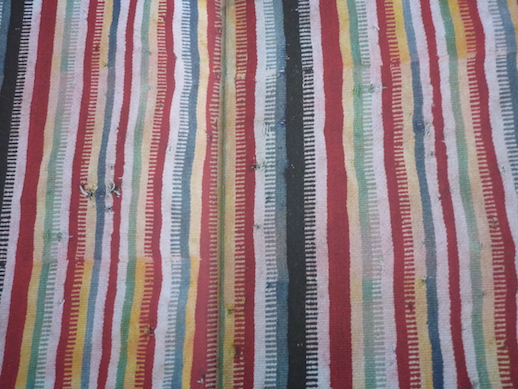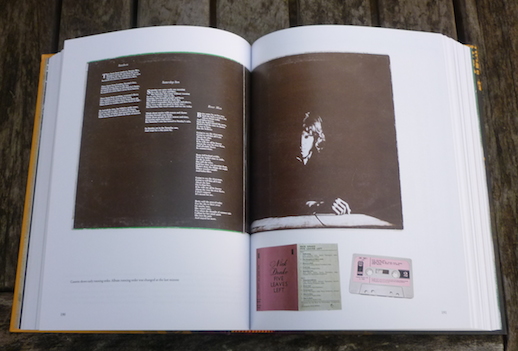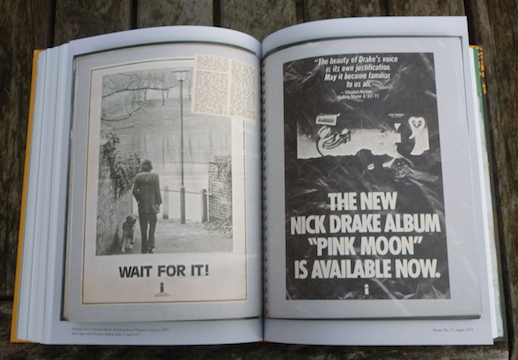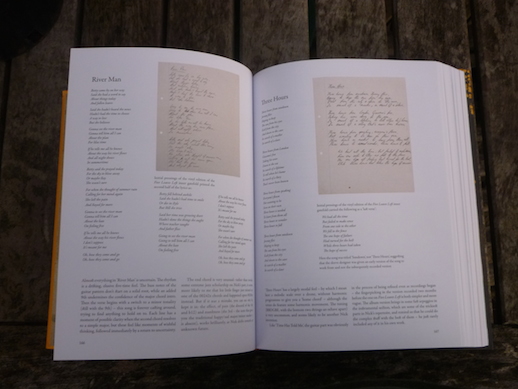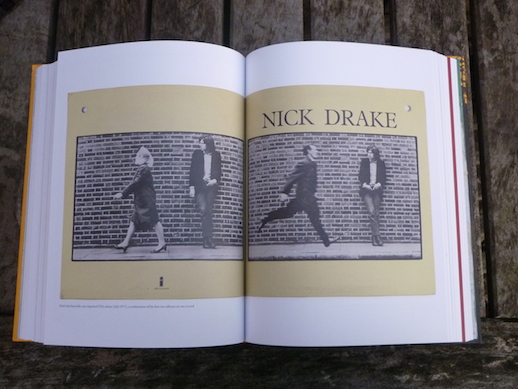Nick Drake: Remembered For A While
(John Murray, hardback, 448 pages, £35)
Review by Andy Childs.
This really is a sumptuous book by any standards. More than a straightforward biography it is a substantial tome in size and scope – part celebration, part scrap-book, and part analysis of a life and a young man’s work that is now universally revered by critics, enlightened music fans and besotted youth alike. Whilst adding depth and some clarity to the story of Nick Drake’s awful descent to the depths of depression, dispelling a few well-worn myths and presenting the most lucid appraisal of his music yet told, Remembered For A While offers no definitive, straightforward answers as to the how and why of Nick Drake’s illness. As his sister Gabrielle, who along with Cally Callomon, assembled this volume over a period of six years, told The Guardian : “ I wanted to slightly complicate rather than clarify the Nick situation because it’s so easy to come up with trite answers – that he came from a stuffy, upper-middle-class background, nobody understood him. That kind of thing. Well, everybody did understand him and still it happened.”
What happened is laid out here in stark detail. Divided into five parts, the book’s first section, The Seed, recounts in three essays his parents’ background and his early, happy, childhood. The Flower, the second and perhaps the most revealing part of the book, details Nick’s time at Marlborough School (bright, sociable, good at sports, popular with fellow pupils and teachers) and his gap year spent travelling and busking, most notably in Aix-en-Provence and Morocco where his talent for songwriting started to manifest itself and his discovery of drugs apparently contributed to re-shaping his personality so that on his return to England his friends noticed a change in him. Never exactly a boisterous character, he grew more introverted and increasingly preoccupied with his music. The chapter by Colin Betts, one of Nick’s fellow-travellers – from his book Frozenlight – whilst written in clipped, quasi-stream-of-consciousness prose, is nevertheless quite telling about the extent of the drug-taking that took place that year and the effect it had on Nick’s state of mind. Reading English at Cambridge University came next, a life he found dull at first but grew to embrace, partly because it’s there that he met Robert Kirby, the man who later did so much to embellish and arrange the orchestration for Nick’s records to such magisterial effect. It was also at university that his songwriting and unique guitar playing blossomed and he began entertaining the idea of a possible career in music. In one of the chatty letters that he exchanged with his son, Rodney Drake makes reference as far back as October 1967 to a tape of Nick’s songs that had been given to Island Records’ boss Chris Blackwell and apparently favourably received. Four months later he played the life-changing gig at London’s Roundhouse where a highly-impressed Ashley Hutchings suggested to Nick that he ought to meet legendary record producer and entrepreneur Joe Boyd. The story of how Nick signed to Boyd’s production company and made records for Island has already been well-documented not least of all by Joe himself who, as “one of the three most important musical relationships in Nick’s life” (Kirby and engineer John Wood were the other two), has worked tirelessly to promote Nick’s music ever since. His first album, Five Leaves Left, was released in July 1969 whilst Nick was still at uni but at the beginning of that year he had already talked seriously about leaving and concentrating on his music. An impassioned yet sympathetic letter from his father (one of several re-printed here), urging him to re-consider, delayed the decision until the October and then Nick finally made the break, a move he apparently later regretted and which, bearing in mind the initial commercial failure of all three of his albums, seems to have been the source of a crippling sense of guilt that he later felt towards his parents and which probably added to the complex web of emotions that eventually brought him down. Slowly but inexorably withdrawing into himself he was unable to reconcile the almost total indifference with which his records were met with his own hightened expectations and those of his collaborators and contemporaries. For such a seemingly diffident character he seems to have been driven by an inner belief in his own ability and was completely crushed when that talent wasn’t widely recognised.
The full extent to which that talent might have blossomed we will never know but the three albums that Nick Drake made while he was alive and the recordings that have since emerged and been issued are now held in such high esteem as to be almost above and beyond any kind of acceptable criticism. In the book’s third segment, entitled The Fruit, Peter Paphides dissects all three albums – Five Leaves Left, Bryter Layter, and Pink Moon – concisely and discerningly and all of Nick’s songs are analysed for musos by Chris Healey with the original lyrics – some hand-written, some typed – reprinted very effectively. Credit is also given in this part of the book to photographer Keith Morris who had great empathy with Nick and whose enigmatic photographs did much to create the ambience of romantic mystery and isolation that shaped peoples’ perception of him. With no known live footage of Nick in existence it is Morris’ photos that have come to define Nick visually and, along with a generous selection of shots from his childhood, youth and university days which inadvertently also emphasise his growing sense of ‘apartness’, these are reproduced stunningly and used extensively throughout the book. Nick Drake was nothing if not photogenic even when you sense that sometimes perhaps he wasn’t really there. But the most affecting part of this segment and perhaps of the book as a whole comes at the end with extracts from Rodney Drake’s increasingly desperate diaries from March 1972 until Nick’s death in November 1974. They are almost totally given over to Mr.Drake’s distressing observations of his son’s deteriorating mental health, his mood swings, his erratic comings and goings, the extended periods of silence punctuated with unsuccessful and plaintive attempts to express the torment of his inner life. It must have been torture for Rodney and his wife Molly and his diary really is the chronicle of a brave and compassionate man – both of Nick’s parents were as supportive, caring and patient as could be possible throughout Nick’s entire life. The diary ends “The worst day of our lives….So ends in tragedy our 3-year struggle”. Nick Drake was found dead just over forty years ago, of an overdose of the antidepressant Tryptizol, at a time when those around him suggested that he might be slowly re-emerging from the awful blackness that had engulfed him.
No one person who knew Nick Drake or studied his life and work seems to have a definitive explanation of what was wrong with him and why he was tormented in the way he was. If one was inclined to draw any conclusions based on the reflective and detailed essays in the fourth part of the book, The Harvest, it would be that he suffered from a deep anxiety and persecution complex born of a sense of failure, probably exacerbated by guilt, enhanced early on by some drug use, and perhaps partly inherited from his mother who also suffered from depression when she was young. That much we know. The rest, in accordance with his sister’s wishes, will remain a matter of conjecture. Perhaps Ian MacDonald is right when he says, in his definitive essay, “critics too easily conclude that he was either a happy man overtaken by depressive illness or a gifted adolescent whose cultivated sensitivity turned pathological. Neither idea is just. The unfashionable probability is that Drake was different, seeing things in a way normal people don’t: an incarnation of the poetic temperament – a reflective mind endowed with unusual perceptions”.
Of course the myth of the doomed, beautiful, tormented poet too fragile and sensitive to cope with real life is a dangerously easy one for disaffected and inward-looking young folk to associate with and one of this book’s great virtues is to skillfully deconstruct that myth without ever de-sensitizing our appreciation of Drake’s life and work. Personally I have always felt that the luminous beauty of his records far outweighs any received sense of gloom or darkness that is projected on them.
Sadly though, not even his parents, who devoted the rest of their lives to cherishing his memory and work, lived to experience the full extent of Nick Drake’s now widespread popularity. Friend and fellow songwriter Paul Wheeler makes the interesting point that because Nick played less than 30 live dates in his life, was quite definitely not over-exposed, and not considered part of the 60s hippie culture he was more readily accepted by the first internet generation of the 1990s. His records were not to be found in their parents’ record collections. The fact is that Nick Drake’s music now, at last, has universal cross-generational appeal and will probably continue to do so for a very long time to come.
And to help enhance his reputation and our enjoyment of his music we have this superb book. I have but touched on the riches it contains. The writing throughout is perceptive and authoritative, never maudlin or self-indulgent. The people who played an important role in Nick Drake’s short life – his family, Robert Kirby, Joe Boyd, John Wood, Paul Wheeler, his friends from university, John and Beverly Martyn, etc – they all have space here so that despite its decidedly non-biographical format, it will undoubtedly be the most rounded and satisfying record of Nick Drake’s life that we’ll ever have. It is also a beautiful book to look at, to hold, and to lose oneself in. Imaginative use has been made of the large format and the lay-out and presentation are clean and very engaging. Relevant press cuttings, sleeve designs, record company ads, letters, etc embellish and illustrate the prose and accentuate the book’s considerable visual appeal. There are but a few recording artistes whose careers deserve such treatment; Nick Drake is definitely one of them.
Andy Childs on Caught by the River
Nick Drake: Remembered For A While can be bought from the Caught by the River shop, priced £35
